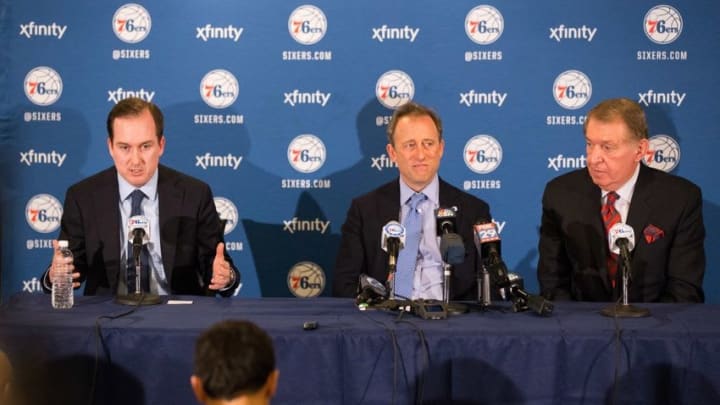
Sam Hinkie’s Resignation is being lauded by many who judge the Philadelphia 76ers on the win loss column. Trouble is, that’s the last place to measure
Imagine trying to judge the impact of an avalanche by looking at one snowflake. Or try to imagine the maximum speed of a car by walking past it in a parking lot. A joke I once heard goes like this: A man was busily searching through the sofa cushions and making an elaborate mess. When his annoyed wife approached him and asked him what he was looking for, he replied that he had lost his car keys and was looking for them. “Where did you lose them?” she asked. “Well, I felt them fall out of my pocket when I was moving things around in the basement.” he answered.
“So why are you looking here?” she demanded. “Because the light is better here.” he responded.
To those of you judging the performance of Sam Hinkie’s tenure with the Philadelphia 76ers by the win loss record, you are like the man searching for keys in his living room. It’s the wrong place to look, but it’s easier to see there, so that’s where you search.
Wins and losses. The reward for the team that does not hoist a championship, but which takes them out of the source of the next one – the NBA draft. In the case of Sam Hinkie, there is a clear distinction to be made. Is the goal simply to win games, or is the goal to win championships? Depending on your answer, you will either find Hinkie’s resignation as a positive step, or as a step backwards.
If the goal is truly wins and losses, the objective of this team shifts in a major way. Every action is simply designed to improve the performance of the team in the following year. Nothing more, nothing less. In the universe of wins and losses, the options are much more finite, there is no learning process. It is the most reactive style of managing a basketball organization possible. Cause and effect. A bad season for a player, that player is cut or traded and a new player is added to assume that role with a better upside – either via trade, free agency, or the draft.
In fact, salary cap dollars are typically maxed out in a Win Loss focus. The reason is obvious – if you have salary dollars to spend on a player who COULD help your team, you spend them. Money burns a hole in your franchise pockets. Look at teams with huge salary cap room. They are under-performers in the NBA. The very nature of focusing on wins drives the price of your players up. Success on your roster suggest success elsewhere. A player who contributes to a win salary demands increase to that of the market. When you play to win, your players seek top dollar – something that exhausts a team’s coffers rather quickly. If you focus on wins, and many teams, analysts, and fans do, your team falls into the salary management annual dance, the one or two NBA draft picks in the middle of round one, and the hope for a miracle to get better.
Miracles are not that common in the NBA.
Next: The Win Loss Paradox?
